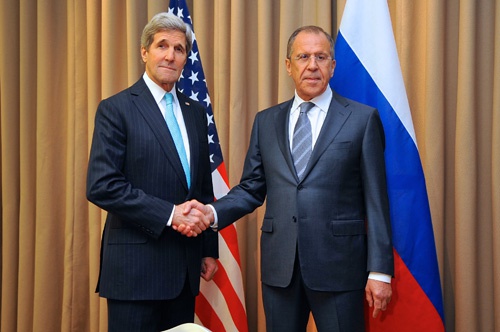|
 |
|
WASHINGTON VS. MOSCOW: U.S. Secretary of State John Kerry (left) shakes hands with Russian Foreign Minister Sergei Lavrov at the start of a meeting to discuss the ongoing situation in Ukraine in Geneva on April 17 (XINHUA) |
Most ceasefire treaties are made to be broken—the only question is when. A four-way agreement reached by parties most closely involved with the Ukrainian crisis falls short of a treaty, suggesting a serious weakness. While the agreement may be short-lived, the crisis and related fallout are likely to last for years.
A fragile deal
The crisis was temporarily tempered with the four-way agreement signed by the United States, the European Union (EU), Russia and Ukraine that calls on all sides to de-escalate tensions in Ukraine on April 17 in Geneva. The agreement will not end conflicts in Ukraine, but it shows that both the Kremlin and the White House hope to avoid deteriorating the regional situation.
"Neither Russia, nor the West, wants to stir up trouble," said Xia Yishan, a senior research fellow with the China Institute of International Studies (CIIS).
The agreement requires all sides to refrain from violence, intimidation or provocative actions. It also promises amnesty to protesters after they pull out of occupied government buildings and surrender their weapons. The Ukrainian Government has agreed to conduct "inclusive and transparent and accountable" discussions for amending the Constitution and protecting minorities' rights, while carrying out a "broad national dialogue" ahead of the presidential election on May 25.
"The agreement put forth lacks teeth. It does not rigorously clarify terms of disarmament and constitutional amendment," explained Xia. Moreover, while the related parties agreed on establishing a federal mechanism in Ukraine, the details are still uncertain, he added.
Qu Xing, President of the CIIS, pointed out that such an agreement is the result of one-on-one negotiations between Moscow and the West. The United States and the EU are on the side of the Ukrainian Government, which cannot claim decisive rights of the negotiations.
Qu said that the agreement reflected the two sides' shared goal of bringing the situation under control. Russian President Vladimir Putin is aware that the West will not tolerate further separation of Ukraine because it would eliminate the buffer zone between Russia and the EU. At the same time, the United States and the EU have little leverage to engage Moscow.
Qu said the West will not take military action against Russia. Furthermore, economic sanctions against Russia will hurt the EU, which relies on Russian natural gas. Politically and diplomatically, the United States and the EU will not be able to pass any UN decision with legal effect, as Russia owns the right to veto as a permanent member state of the UN Security Council.
Gaining Crimea is enough to satisfy Russia's appetite, argued Xia, while the U.S.-headed West is preoccupied with U.S. President Barack Obama's "pivot to Asia" strategy. "Clearly, Washington feels more threatened by Beijing than Moscow," he said. According to the result of a referendum held on March 16 in Crimea, more than 96 percent of the voters approved the motion of Crimea joining the Russian Federation. Five days later, Putin signed two documents, accepting Crimea and the city of Sevastopol as members of the federation.
Obama and Putin are not optimistic about the future of the four-way agreement. Right after the deal, Obama said that in light of past experiences, he feared Putin would not obey the terms. He said that according to his agreement with German Chancellor Angela Merkel, once agreed common understandings fails to be implemented in time, they will adopt further measures. The United States is ready to respond to Russia, but military action will not be included, said Obama. Washington announced on April 17 that it would provide military assistance to Ukraine and deepen defense cooperation with Poland to cope with the Ukrainian crisis.
| 